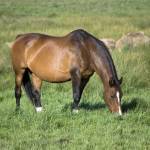Feeding Broodmares in Early Pregnancy

To feed the broodmare correctly during pregnancy, it is important to understand that the fetus does not grow at a constant rate throughout the entire 11 months of pregnancy. It is very small during the first five months of pregnancy; even at seven months gestation, the fetus has attained only approximately 20% of its birth weight and equals less than 2% of the mare’s weight. Therefore, its nutrient requirements are minuscule compared with the mare’s own maintenance requirements and so the mare can be fed as though she were not pregnant. An ideal diet would be pasture with a vitamin/mineral supplement. Obviously if pasture is poor or scarce, additional hay or chaff should be fed (at least 1–1.5% body weight per day or ad libitum if hay quality is average to poor).
All too often, the early-pregnant mare is fed as though she were “eating for two,” which can lead to obesity and problems with foaling. Obesity of broodmares is a serious problem, not only affecting fertility and conception, but seriously risking the health of the fetus by predisposing the foal to developmental orthopedic diseases after birth.
If pasture quality is high while the mare is pregnant, it may even be necessary to restrict grazing by confinement, but for no longer than eight hours to prevent digestive upsets. On the other hand, the mare in early pregnancy should not go into a negative energy balance and lose condition. Picky eaters, poor doers, and lactating mares with foals at foot need to be carefully monitored. Mares in poor condition are more likely to lose the pregnancy, and if the mare is producing large quantities of milk as well as being pregnant, she will lose condition on dry, scarce pasture without supplementary feeding.








